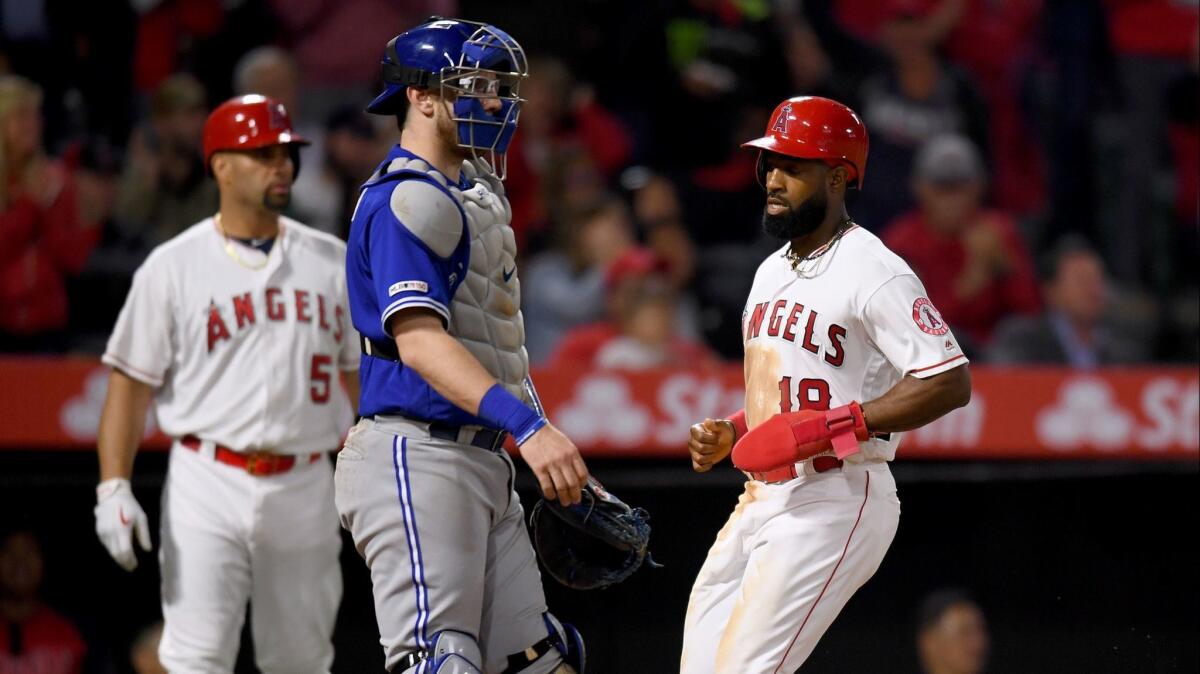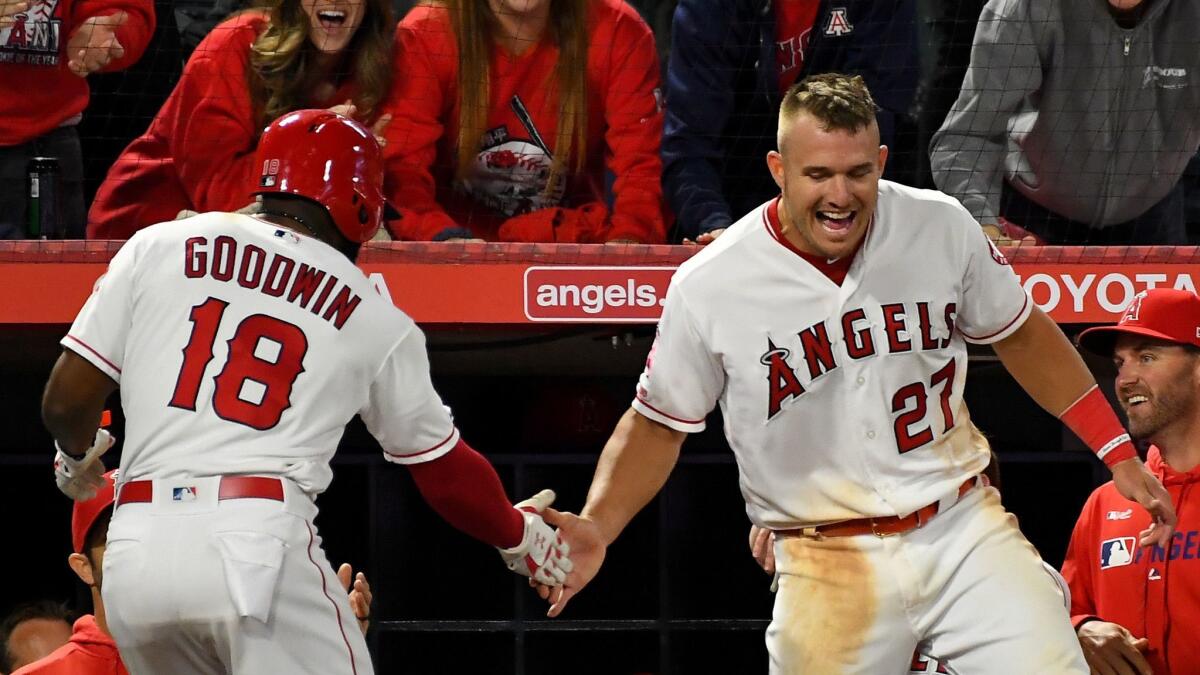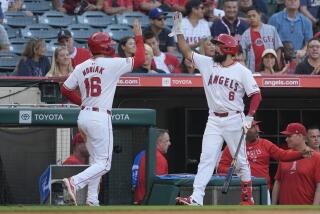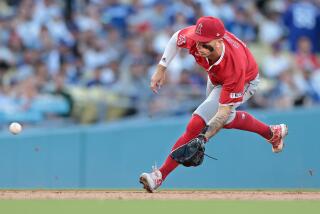Column: Angels reap the benefits of Brian Goodwin’s surprising production

The Angels were a day away from opening their season and were still searching for a left-handed-hitting outfielder to replace Justin Upton, who had stubbed his left big toe and had been diagnosed with turf toe, creating a problem both immediate and long term.
Their decision to claim Brian Goodwin off waivers from Kansas City didn’t seem momentous. Once a first-round draft pick of the Washington Nationals, he was traded to the Royals during last season and batted .266 in 27 games with them. “I knew nothing about him,” said Angels manager Brad Ausmus, “so everything’s been a surprise.”
A very pleasant surprise, to say the least. Goodwin has provided solid outfield defense and surprisingly good life with his bat, becoming an everyday player while batting .341 with a .427 on-base percentage and .557 slugging percentage. He went three for four against Toronto on Thursday at Angel Stadium.
To know Goodwin, who recorded his first stolen base as an Angel on Thursday, is to appreciate him. “We really needed an outfield body and we ended up getting Brian Goodwin,” Ausmus said, “which turned out to be a very good player and outstanding as a hitter.”
Goodwin didn’t know very much about the Angels when he joined them. Disappointed the Royals had waived him after he’d expected to win a regular job, he had gone home to Rocky Mount, N.C. Two days after being released he got the call from the Angels and joined them in Oakland for their opener on March 28. He knew names, but little beyond that. “For them to be in as big of a market, L.A, you expect to know a lot more, but you have the Dodgers up the street and they dominate the media. That kind of plays into it too,” he said.
“Just looking at the outfield, I knew who they had over here. I was just looking forward to being in a strong defensive outfield with a strong lineup that could potentially win a good amount of games. And that’s really all I needed. I got here and I felt pretty comfortable from Day One and I think I’m fitting right in.”
He said he has never looked back to his time with the Royals, an approach that fits with his overall life philosophy. “I can’t really live with regrets,” he said. “Every decision I make, I do it for a reason. The people around me support it. My parents support it. My family supports it. My whole support system supports it and everything I do, I do to better myself. When somebody doesn’t see that or maybe agree with it, you can’t expect them to believe in it the same way that you do.

“Everything I did, I did for me and it seems to be paying off for me now. I definitely don’t have any regrets. I can’t really say I’m sorry that I’m not there, because I’m in such a good place now.”
He’s quickly making himself at home with the Angels. In both Washington and Kansas City he became involved with his team’s youth academy, mostly by speaking to youngsters about life choices and the dangers of taking the wrong path. He returned to those topics while speaking to a group of local kids this week. “To talk about the game and not getting caught up in the street life and peer pressure and that kind of thing,” he said of his message. “That’s where I come from. I can relate to those kids that have that kind of peer pressure and have friends that want to live a different life and things like that, and it’s so much harder when you’re younger to say no to your friends and the people you hang out with and look at as cool, and stuff like that.”
He has faced those tough choices. “Where I’m from, yeah, there’s a lot of extracurricular activities to get into that are frowned upon,” he said. “I think that’s everywhere. Just being around it, you get to see the good and the bad of it and fortunately I was blessed with the parents that I had that could help me stay, and the community also helped me stay, on the right path. I think everybody goes through it. It’s going to happen because it’s glorified. It’s just one of those things where you can see it on TV, you can see people living it and being successful doing stuff and it’s just not reality. But it’s hard to know that until you’ve been through it or else you’ve seen somebody go down that road. I got a chance to see both sides of it, and I got a chance to see the good and the bad, and ultimately you make a choice. I think I chose against it.”
Sign up for our daily sports newsletter »
As the only African American player on the Angels, Goodwin also feels a responsibility to set a see-it, be-it example for kids. Chicago White Sox shortstop Tim Anderson, the American League batting leader and also the only black player on his team, told Sports Illustrated he feels like “today’s Jackie Robinson” for changing the game, though in a lesser way than Robinson did, by bringing back fun and flair. According to the Institute for Diversity and Ethics in Sport’s racial and gender report card, African Americans comprised 8.4% of the players on 2018 opening day active rosters, up from 7.7% in 2017. In 1991, 18% of all players were African American.
“Being a minority in this game, there’s definitely a need to reach out to the little kids that look like you, that are still in that position where they’re trying to decide what they want to do, who they want to be. And they’re looking for somebody to look up to, pretty much,” Goodwin said. “I feel that you definitely have to be involved on some type of scale where you can use your position to be able to reach out to those kinds of communities and those kids at a young age.”
The more there is to know about him, it seems, the more there is to like.
More to Read
Go beyond the scoreboard
Get the latest on L.A.'s teams in the daily Sports Report newsletter.
You may occasionally receive promotional content from the Los Angeles Times.






